Related Research Articles
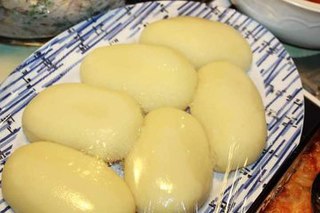
Fufu is a pounded meal found in West African cuisine. It is a Twi word that originates from the Akans in Ghana. The word has been expanded to include several variations of the pounded meal found in other African countries including Sierra Leone, Guinea, Liberia, Cote D'Ivoire, Burkina Faso, Benin, Togo, Nigeria, Cameroon, the Democratic Republic of Congo, the Central African Republic, the Republic of Congo, Angola and Gabon. It also includes variations in the Greater Antilles and Central America, where African culinary influence is high.

Ẹ̀bà (Yoruba) also known as Ebe or Pinon' is a staple swallow from Nigeria, Togo and Benin, also eaten in the West African sub-region and other African countries. The term èbà originates from Yoruba. It is a cooked starchy vegetable food made from dried grated cassava (manioc) flour commonly known as garri all across West Africa. It is often eaten with rich soups and stews, with beef, stockfish or mutton. The dish is often described as having a slightly sour, sharp taste.

Egusi (Yoruba) is the name for the protein-rich seeds of certain cucurbitaceous plants, which, after being dried and ground, are used as a major ingredient in West African cuisine. Egusi is a Yoruba word, and the popular method of cooking it is deeply rooted in Yoruba culinary traditions.

In West Africa, garri is the flour of the fresh starchy cassava root.

Àmàlà is a staple swallow food originating from Nigeria popularized by the Yoruba ethnic group of Southwestern Nigeria and other parts of Yorubaland. It is made of yam, cassava flour, or unripe plantain flour. Tubers of yams are peeled, sliced, cleaned, dried and then ground into flour. It is also called èlùbọ́. Yams may be yellow or white in colour but turn brown when sun dried which gives àmàlà its colour. It is a popular side dish served with ewédú and gbẹ̀gìrì, but is also served with a variety of other ọbè(soups), such as ẹ̀fọ́, ilá, and ogbono.
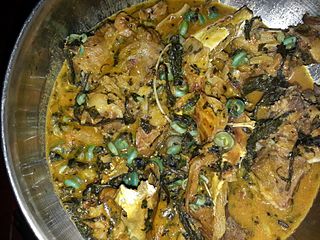
Ogbono Soup is a Nigerian dish made with ground dry ogbono seeds. Ogbono seeds are originated and were first grown in Southern Nigeria with considerable local variation. According to research by Chris Chinaka and J.C. Obiefuna, Ogbono is an indigenous forest tree associated with plants classified as 'non-timber forest products. It goes by various indigenous names among Nigerians. The Common use of the word “ogbono” in general Nigerian parlance stems from the Igbo name for the word. Among the Nupe, it is called 'pekpeara', 'ogwi' in Bini, 'uyo' in Efik, and 'oro' or ‘apon’ in Yoruba. Although ogbono and ugiri, the Igbo name for bush-mango, are very similar indeed and often regarded as equivalents, there is technically a distinction.

Draw soup is the name of soups from the southeastern and southwestern parts of Nigeria that are made from okra, ogbono , or ewedu leaves (jute). The name derives from the thick viscosity characteristic of the broth as it draws out of the bowl when eaten either with a spoon or, more characteristically, by dipping a small piece of solid (fufu) into it. It can be served with numerous Nigerian fufu meals, including eba (garri) and pounded yam. Ewedu can be used to make a Yoruba soup that is traditionally served with amala.

West African cuisine encompasses a diverse range of foods that are split between its 16 countries. In West Africa, many families grow and raise their own food, and within each there is a division of labor. Indigenous foods consist of a number of plant species and animals, and are important to those whose lifestyle depends on farming and hunting.

Nigerian cuisine consists of dishes or food items from the hundreds of Native African ethnic groups that comprises Nigeria. Like other West African cuisines, it uses spices and herbs with palm oil or groundnut oil to create deeply flavored sauces and soups.

Peanut soup or groundnut soup is a soup made from peanuts, often with various other ingredients. It is a staple in African cuisine but is also eaten in East Asia (Taiwan), the United States and other areas around the world. It is also common in some regions, such as Argentina's northwest, Bolivia and Peru, where it can sometimes be served with bone meat and hollow short pasta or fries. In Ghana it is often eaten with fufu, omo tuo and banku often very spicy. Groundnut soup is also a native soup of the Benin (Edo) people in Nigeria and it is often eaten with pounded yam. Some of the essential ingredients used in making it are: Ugu, Oziza leafs Piper guineense and Vernonia amygdalina.

Egusi sauce or Egusi Soup, traditionally Egusi or Obe Egusi in Yoruba, is a culinary sauce prepared with egusi seeds as a primary ingredient. Egusi seeds are the fat- and protein-rich seeds of certain cucurbitaceous plants. Egusi sauce is common and prevalent across Central Africa as mbíka, and may be served atop rice, cooked vegetables, or grilled meat, such as goat, chicken, beef, or fish. It may also be served atop fufu, omelettes, amala, and eba, among other foods. Egusi soup is also consumed in West Africa, sometimes with chicken.
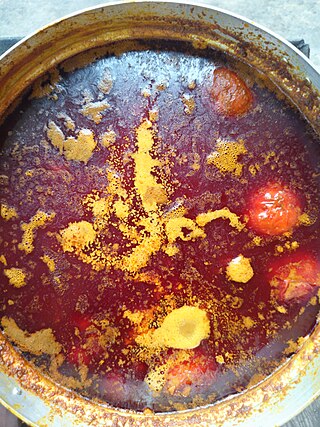
Palm nut soup or banga is a soup made from palm fruit common in the Cameroonian, Ghanaian, Nigerian, Democratic Republic of Congo and Ivorian communities. The soup is made from a palm cream or palm nut base with stewed marinated meats, smoked dried fish, and aromatics. It is often eaten with starch, fufu, omotuo, banku, fonio, or rice. The use of the palm fruit in cooking is significant in Ivorian, Cameronian, Nigerian, Ghanaian, Liberian and other West and Central African cuisine.

Oha soup is a soup mostly eaten in the south eastern part of Nigeria.
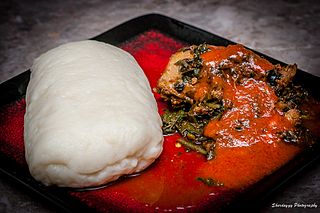
Pounded yam or Iyán (Yoruba) or Ruam-Yo (Tiv) or sakwara in Hausa, "Akpu, Utara-ji or Nni-ji" (Igbo) is a Nigerian swallow or Okele food native to the Yoruba, Edo, Igbo Tiv and Ebira ethnic groups. It is a traditional food prepared by pounding boiled yam with a mortar and pestle. Pounded yam is similar to mashed potatoes but heavier in consistency. It is a smooth and tasty delicacy traditionally eaten with the hands.
Pawpaw soup is a popular delicacy of one of the Tiv ethnic group of Nigeria, the soup is made up of dry pawpaw flakes, palm oil, beef and egusi.
Ofe achara is an Igbo soup made mainly from Achara and mgbam. Ofe In the language refers to soup.
Ofe Owerri is an Igbo delicacy in the South-Eastern part of Nigeria. The soup is made with snails, beef, assorted meat and fishes.
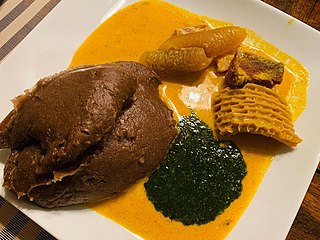
Edo traditional food consists of dishes or food items common among the people of Edo State. The State is home to various ethnic groups including the Binis, Ishan (Esan), Afemai, Etsako, Uzebba Iuleha people [Owan] and others. The Traditional food found among these people usually involves soup and swallow. 'swallow' is a term for Nigerian meals that are taken with soup and ingested without chewing.

Yoruba cuisine is the numerous and diverse foods of the Yoruba people of Yorubaland. Some notable Yoruba food include : Ọ̀fadà, Àsáró, Mọ́í Mọ́í, Ẹ̀gúsí soup, Àbùlà, Àkàrà, Ilá Alásèpọ̀, Ẹ̀fọ́ rírò with Òkèlè, etc.
Okele, also known as "swallows" in pidgin Nigeria English, is a Yoruba food category and word for various starchy foods eaten with soups. Ingredients used to make okele include yam, fermented cassava, cassava granules with hot water, plantain, wheat flour, yam flour and cocoyam. Okele in Yoruba cuisine includes iyan, eba, fufu, amala, lafun, semo and pupuru.
References
- ↑ "How to Make Eka Soup ( Beni seed soup)". www.onga.ng. Archived from the original on 2021-01-17. Retrieved 2022-06-14.
- ↑ "Eka Soup (Beniseed Soup) Recipe". The Guardian Nigeria News - Nigeria and World News. 2020-08-09. Retrieved 2023-05-30.
- ↑ "Eka Soup (Beniseed Soup) Recipe". The Guardian Nigeria News - Nigeria and World News. 2020-08-09. Archived from the original on 2021-06-25. Retrieved 2022-06-14.
- ↑ "Cook The Delicious Banga Soup The Niger-Delta Way". The Guardian Nigeria News - Nigeria and World News. 2020-04-19. Archived from the original on 2020-11-30. Retrieved 2022-06-14.
- ↑ "Bring your tastebuds alive with Banga soup". Tribune Online. 2016-08-12. Archived from the original on 2016-08-14. Retrieved 2022-06-14.
- ↑ "Learn How To Make Delicious Egusi Soup". The Guardian Nigeria News - Nigeria and World News. 2019-06-02. Archived from the original on 2022-05-28. Retrieved 2022-06-14.
- ↑ "Ogbono Soup". Tribune Online. 2018-12-01. Archived from the original on 2022-02-14. Retrieved 2022-06-14.
- ↑ "How to Make Eka Soup (Beni seed soup)". www.onga.ng. Archived from the original on 2021-01-17. Retrieved 2022-06-14.